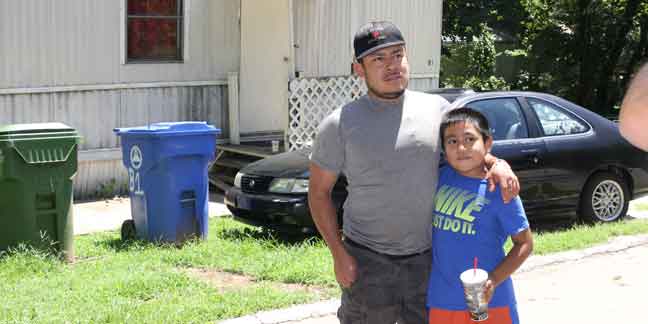 ARDEN — Miami Circle is empty now. No children are playing under the shady oak trees or riding their bikes along the quiet street. No one is chatting on their front decks that peek out over Lake Julian, or sharing the latest news at the neighborhood mailboxes.
ARDEN — Miami Circle is empty now. No children are playing under the shady oak trees or riding their bikes along the quiet street. No one is chatting on their front decks that peek out over Lake Julian, or sharing the latest news at the neighborhood mailboxes.
The last of the 55 families who once called Miami Circle home moved out this week, after the land they lived on for decades was sold to a developer who will build a 290-unit apartment complex there. But what began as a sad, inevitable chapter in the gentrification of south Asheville became so much more – thanks to the Holy Spirit and the work of a tenacious group of parishioners at St. Barnabas Church in Arden.
The story began Jan. 31, when residents of Lakeview Mobile Home Park (as Miami Circle is formally called) received letters notifying them that the land beneath their trailer homes had been sold. Each family would get $1,000 to move out by July 1.
“We didn’t know how to react. How do you react? Who do you scream at?” says Maria Escobedo, who’s lived on Miami Circle for eight years. We were shocked, we were mad.”
The residents – mostly poor, first-generation Latino immigrants with limited English and knowledge of the law – were also scared.
“We’ve been there so long that it was just like one big family. Everything was just perfect,” recalls Escobedo. “Once the letter came, we were like, ‘What do we do? How do we get out of here so quickly?’ We’d been living here so long that it was just a shock.”
Residents turned to Deacon Rudy Triana at St. Barnabas Church. As the Hispanic liaison for the parish, Deacon Rudy knew that more than half of Miami Circle’s residents were parishioners.
“A lot of them were in tears,” Deacon Rudy says. “The majority of them are very shy, very afraid of their position, and they really didn’t know what their rights were.”
Pictured: Miguel, who lived on Miami Circle for 10 years, tried to find a buyer for his mobile home without much success. Originally from El Salvador, Miguel says, “They say this is a nation of immigrants – I guess because you have to move from one place to another constantly.” (Photos by Patricia L. Guilfoyle, Catholic News Herald)
With the approval of Father Adrian Porras, pastor, the deacon quickly recruited others to the cause: among them Susan Chitwood, chairperson of the parish’s Peace and Social Justice Commission; John Smith of the local St. Vincent de Paul Society, which had helped many of the residents in the past with financial assistance; and Nick Haskell, Catholic Charities’ poverty and justice education coordinator for western North Carolina. Chitwood, an attorney, and Deacon Rudy, with 30 years’ experience in real estate and development, spearheaded the team, which grew to include other churches and civic leaders and – importantly – the Miami Circle residents themselves.
Following Haskell’s advice, the residents chose leaders to represent them, including the bilingual 20-year-old Escobedo as neighborhood president.
“We had a couple of meetings at the mailboxes,” Escobedo says with a laugh. “That’s the only place where you could actually meet. It was perfect for everybody.”
This teamwork was critical, Haskell points out, to ensure “that it’s not the Church doing this for people, it’s us doing it together.”
They figured out how much it would cost for the residents to move their trailers or find new homes, and what other help they needed. And they listened closely to the residents, some of whom were afraid to go up against the developer given their tenuous position.
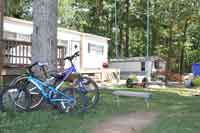 Children are no longer playing on the swing or riding their bicycles in the Miami Circle neighborhood of Arden. The 200-plus residents have moved out, thanks to help from St. Barnabas Church members and others, before the land is redeveloped for an apartment complex. Most of their mobile homes have largely been abandoned because they are too old to move or sell.
Children are no longer playing on the swing or riding their bicycles in the Miami Circle neighborhood of Arden. The 200-plus residents have moved out, thanks to help from St. Barnabas Church members and others, before the land is redeveloped for an apartment complex. Most of their mobile homes have largely been abandoned because they are too old to move or sell.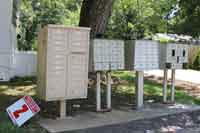
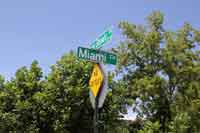 “They were scared that if they pushed it too far, it could be worse,” Escobedo says.
“They were scared that if they pushed it too far, it could be worse,” Escobedo says.
They knew there was no law to prevent the residents from being evicted. And while many of them owned their mobile homes, they had only month-by-month ground leases. Even if they could pick up and move, the trailers were too old to put on the road again, and mobile home parks with vacancies in the Asheville area are scarce. In fact, Buncombe County has only a 1 percent vacancy rate on apartments and affordable housing options are rare, Smith notes.
“So there’s nowhere to go.”
Deacon Rudy and the others arranged a meeting at the church with the developer, Hathaway Development of Atlanta. It was a pivotal moment, everyone says.
With the help of volunteer translators from nearby St. Eugene Church in Asheville, residents found their voice. They explained how they would be forced to leave friends they’d known for years, their children would have to change schools, they didn’t know where to go even if they did have the money to move. Also, Miami Circle was perfectly situated near the grocery store and school – no car needed. People were losing more than just their homes.
“That was very moving for me and I think for the other people there,” recalls Haskell. “Because people were just really saying how they felt about what was happening. You could see how hard it was for them. They really didn’t feel that they had a voice. They didn’t think people would listen to them, because they felt marginalized.”
Deacon Rudy recounts persistently negotiating with the developer for more time to move and more money – first $2,000, then $4,000, then $8,500. He, Chitwood, Escobedo and others attended hundreds of hours of meetings and sought help from anyone in the community they could think of. Through all the ups and downs of the process, they say they learned more about local politics than they ever imagined, and they suffered doubts about ever having any success for the people of Miami Circle.
At a June 14 Asheville City Council meeting, thanks to mediation from Mayor Esther Manheimer, the developer offered a payment of about $5,253 per family and an extension to Sept. 1 to move out. The residents, led by Escobedo and Deacon Rudy, gratefully accepted.
“Under the law, the City Council didn’t have to listen to us at all,” Deacon Rudy says. “The developers, under the law, didn’t have to give us one penny – not even $1,000.”
He told city leaders after the vote, “Thank you for giving a voice to the voiceless, a face to the faceless, and dignity that Jesus Christ has guaranteed us all.
“That was the moral authority of the Church, and I really think that the Holy Spirit guided all of us to this conclusion,” he says.
Adds Chitwood, “We always worked from our hearts. It was just like a drum beat, a heartbeat. And it worked.”
Developer Nick Hathaway told the Asheville Citizen-Times afterwards, “We all worked together to our best with such a complicated and difficult situation. We were just happy that everyone had found an acceptable agreement that was the best we could financially offer for support.”
But the story doesn’t end there.
When it came time to give out the first of two payments to the Miami Circle families at the parish on Aug. 1, the Holy Spirit was present again, they say.
Deacon Rudy, Chitwood, Escobedo and the others were all there, so was Miami Circle’s landowner Wes Reinhardt. Homeward Bound, an Asheville non-profit that finds housing for the homeless, had been chosen to hand out the money, but during the meeting Reinhardt jumped in, personally speaking with families as they received their checks. A spirit of joy spread through the room.
“People were so friendly,” Chitwood recalls. “It was like we’d all grown up and gone to elementary school together!”
Residents will receive the rest of their money sometime in September, when the developer closes on its apartment deal. Meanwhile, they’ve all either sold or abandoned their old trailer homes to resettle wherever they could find affordable housing. The St. Vincent de Paul Society is using a $5,000 grant from the National Council of the U.S. Society of St. Vincent de Paul to help with moving expenses.
And St. Barnabas parishioners have learned a lot.
Escobedo not only found an apartment, she discovered an interest in business and is changing her major at Asheville–Buncombe Technical Community College.
And, as she has seen the ties grow closer between St. Barnabas’ Anglo and Latino parishioners, she notes, “I pretty much earned a new family with all of this. People are now coming together. It was a blessing at the end of the day.”
“Never doubt what God is telling you. Never doubt your faith,” she says. “Be strong, and ask for help when needed, because there’s people there to help you.”
Deacon Rudy says he is thankful to God that the parish could serve as the hands of Christ for the people of Miami Circle.
“It was a great way for the Church to be seen in the community – that we’re not just about ourselves, but that we care about the whole community,” adds Haskell. “It is the Church putting faith into action, and living its faith outside of the church building.”
Chitwood says she’s learned that “through prayer, whether formulated or just felt, if you act in faith, graces are given.”
Everyone agrees that through God’s grace, they turned what had been a problem affecting a group of poor people into an opportunity to grow closer to fellow brothers and sisters in Christ, no matter which side of the negotiating table they were on.
“That’s what we’re called to do: love our neighbor,” Chitwood says. “Everybody has dignity. He or she is created in the image and likeness of God, whether they have a bank account that’s huge or a house that’s in shambles, or no house.”
This was about Catholic social justice – solidarity and subsidiarity – in action, she adds.
“This wasn’t a big government movement. This was just people, local people, saying, ‘Wait a minute. Something’s not right about this. Let’s make it right.’ And we did. We did.”
— Patricia L. Guilfoyle, Editor
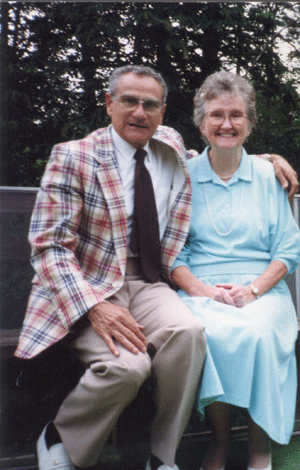 WINSTON-SALEM — At 99 years old Joseph Baldi is more active than most people half his age. He lives independently, tends his vegetable garden, cooks meals (his mother’s special spaghetti recipe is a favorite), cuts his own lawn and walks one mile each day with friends. He is also an active member of St. Leo the Great Church in Winston-Salem, where he ushers and has recently honored his late wife Margaret with a special endowment fund.
WINSTON-SALEM — At 99 years old Joseph Baldi is more active than most people half his age. He lives independently, tends his vegetable garden, cooks meals (his mother’s special spaghetti recipe is a favorite), cuts his own lawn and walks one mile each day with friends. He is also an active member of St. Leo the Great Church in Winston-Salem, where he ushers and has recently honored his late wife Margaret with a special endowment fund.
Baldi worked as a senior project engineer assigned to government projects for more than three decades before retiring from Lucent Technologies in 1981. He met Margaret, a nurse, while they were both working at Western Electric in New Jersey.
"When I injured my back on the job, my supervisor sent me to the company doctor,” he recalls. “Margaret was the nurse that day, and the next day I saw her again on the bus on the way to work. We started talking and two years later we were married.”
They spent the next 60 years together. During that time, they raised a son and a daughter and lived in Germany, France, Japan, Hawaii and Thailand for his work on various communications projects.
“When I was released from the service, my first assignment was with Project Mercury, the man in space program. Then I was reassigned to the Government Services Department, which took us to Paris for four years, and we also spent four years near Heidelberg, Germany. My daughter learned to speak both French and German and we enjoyed our time there.”
When they returned from Europe, Baldi was offered another job opportunity – this time in North Carolina.
“I was asked to be a project engineer on the Safeguard Project. So we moved here in 1972 and have lived here ever since,” he says.
A self-proclaimed “outdoors person,” he says, “I am busier now during retirement than when I worked! I love gardening and grow
more than I need so I can share my harvest with neighbors.”
He has also decided to share with his parish, specifically with the children of St. Leo School. After learning about the Robert and Gladys Vitelli Memorial Endowment Fund, Joseph was inspired to give back in the same way.
“I thought an endowed fund was something I could do, too,” he explains. “I had heard that some of the children who wanted to attend St. Leo School could not afford the tuition, so I created the Joseph and Margaret Baldi Fund to provide tuition assistance.”
Baldi, who has also provided support for his parish and Catholic Charities Diocese of Charlotte through charitable gift annuities, says he liked the idea of honoring his wife with this special gift.
“We have four grandchildren and 11 great-grandchildren, and I know my wife would have loved the idea of a gift that helps children get a good Catholic education.”
— Reprinted from “Your Legacy,” a Planned Giving newsletter for the Diocese of Charlotte

